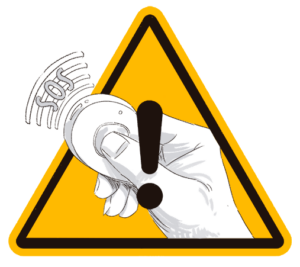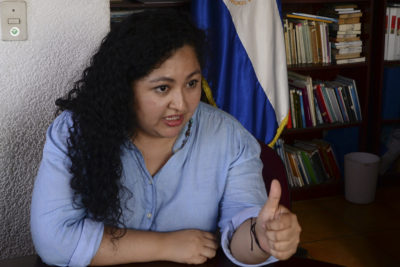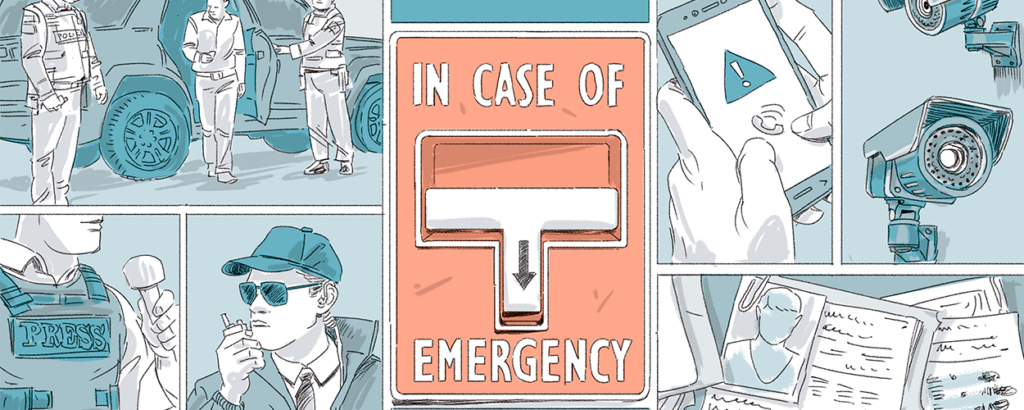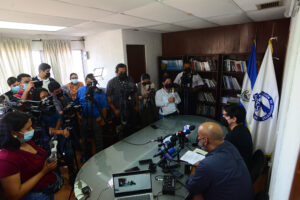By Jessica Ávalos**
This is the fourth story in a series on protection mechanisms for journalists in Latin America.***

(Illustration: Pablo Pérez - Altais)
Antonio arrived at a checkpoint in the Santa Lucía neighborhood, east of San Salvador, on the morning of Tuesday, March 29, 2022. Soldiers were checking citizens in that area. The photojournalist got out of the vehicle that was transporting him and took several photographs. He then greeted one of the soldiers, but when another looked at him, Antonio ended up surrounded. His camera, the only instrument he had to defend himself and document what was happening, ended up in the hands of the military and his material was erased.
“They asked me for my identification and when I told them that I worked at El Diario de Hoy, they got angrier. I was cornered between several soldiers and I couldn't move. They brought me to my knees. I had to take off my harness and they had me kneeling for about 15 or 20 minutes,” the photojournalist, whose real name is not published for his safety, told LatAm Journalism Review (LJR).
El Salvador lags behind other Latin American countries, like Mexico, which have passed special laws to protect its journalists. A bill called "Special Law for the Comprehensive Protection of Journalists,” which was under study for almost three years, was archived on May 19, 2021, two weeks after the new Legislative Assembly began and, since then, it has not returned to the entity’s agenda.
The initiative was presented on Oct. 23, 2018 by the Association of Journalists of El Salvador (APES, for its acronym in Spanish) and by the Roundtable for the Protection of Journalists and Media Workers, made up of human rights organizations. APES, the largest and oldest journalists' association in El Salvador, decided to promote a law after in 2017 it began to record an increase in attacks against media workers.
"Work began on the draft bill at the end of that year (2017) as a result of a considerable increase in attacks on journalists, there were threats from gangs and there was a high number of dismissals that occurred," Angélica Cárcamo, former president of APES who led the lobbying for the approval of the law for months before the bill was archived, told LJR.
When the initiative entered the Assembly in 2018, the country was still governed by the left-wing FMLN party and President Salvador Sánchez Cerén. A year later, with the end of the historical bipartisanship that had prevailed in El Salvador, Nayib Bukele came to power, but the opposition parties still had control of the Legislature. It wasn’t until May 2021 that Nuevas Ideas, Bukele's party, took control of the legislative branch because it won the majority of deputy seats.
In 2018, APES had presented an assessment on the situation of women journalists that revealed salary gaps, harassment and other problems within the media.
“All this context caused discussions to begin in the association and, with the support of Internews, it was possible to finance the drafting of the document. We did not want it to draw only from the needs of the board of directors. The basis was focus groups with journalists from the interior of the country,” Cárcamo told LJR.

Angélica Cárcamo, former president of APES, during and interview. Photo courtesy of FACTUM/Gerson Nájera
APES has a monitoring center that records attacks against the press. According to a recent report, between January 2022 and April 28, 2022, there were 38 attacks, ranging from the hacking of journalists' accounts to unjustified dismissals or restrictions on journalistic activity. Public officials and users of social networks are the main aggressors, according to this report.
Attacks have been on the rise. In 2020, the journalists association reported 125 violations against journalists. In 2021, it documented almost twice as many as those recorded a year earlier: a total of 219 cases.
And not only that. Behind or on a par with these attacks is the hate speech the Salvadoran government has established against the press in this country. Phrases like: “They pass themselves off as ‘journalists,’ but all Salvadorans know that they are only paid pens,” Bukele himself posted on Twitter.
Hostility against those who practice journalism has increased in recent weeks since an emergency regime has been in force due to an unprecedented wave of violence since the signing of the Peace Accords. The Legislative Assembly also recently approved some law reforms that provide up to 15 years in prison to those who report on certain gang activity.
Journalists and investigators have had to leave the country due to threats received on their social networks. The president of the Legislative Assembly, Ernesto Castro, said in the last plenary session: “These ‘uncomfortable’ journalists, who are afraid, they say… We don’t need them. Go away!”
The bill that was cut short
The draft bill archived in 2021 contained 56 articles. The objective of the law, according to the draft, was to guarantee the prevention, protection and safeguarding of journalists against any type of violation, aggression or attack that put their lives, integrity, security and rights at risk.
It also included a mechanism for receiving complaints and another for inter-institutional coordination in a roundtable for the protection of journalists, which would be made up of the Attorney General's Office and the Human Rights Ombudsman's Office. The prosecutor's office would have to create, by law, a specialized office to investigate crimes committed against press workers.
“The most important elements were the recognition of the need to strengthen the human rights protection mechanisms of the profession. And the creation of new institutions that would ensure the respect and protection of the activities carried out by this sector,” summarized Roberto Burgos Viale, the consulting lawyer who participated in the study of the draft bill, in an interview with LJR.
The ruling Nuevas Ideas party swept the legislative elections and took full control of the legislature in 2021. The Legislative Assembly was completely replaced on May 1 of that year and, in the months prior to that date, when the traditional ARENA and FMLN parties were about to lose power and become members of the opposition, they began to promote the approval of the law.
APES and the Protection Roundtable began a crusade just before the change in legislative makeup to get the law approved. At the end of April 2021, they presented the revised document to the Commission on Legislation and Constitutional Points, but they never managed to see it approved.
“It was an ambitious law, I admit it, because it sought to protect those who had not graduated or people who were studying. It was like wanting to grab a lot. The most cumbersome issue for some parties was labor rights, because that was touching the companies and because there was fear that these articles could be used to affect the media,” Cárcamo said.
The bill was archived when it was in the home stretch to be approved. The Legislation Committee managed to advance in the study of the draft bill by 95 percent before it would send it to a vote, and it only had to study the sections on the application of sanctions for those who did not comply with the regulations.
The approval of a law in the Salvadoran parliament requires 43 votes. Nuevas Ideas, the party of President Nayib Bukele, achieved more than that: it has 55 deputies and since May 1, 2021, it chairs all of the legislative commissions, including the Legislation and Constitutional Points commissions, which was studying the bill for the protection of journalists.
“Prior to this new political dynamic, the draft bill had become an element of polarization between the opposition parties and the representatives of the ruling party, who viewed with mistrust a draft bill that was championed by their opponents. In the end, almost six months of work and political lobbying by APES and its allies were lost,” explained Burgos, the lawyer.

(Illustration: Pablo Pérez - Altais)
Nuevas Ideas Deputy Marcela Pineda, who became president of the Legislation Commission in May 2021, said that the draft bill would be archived, along with more than 200 files, because it did not meet the protection conditions required by the sector, according to national media reports. She, however, is the initial author of the draft bill because APES hired her as a consultant when she was not yet a deputy, according to Cárcamo.
"The most ironic thing was that Deputy Marcela Pineda was a collaborator of this draft bill along with Óscar Campos. It is ironic that someone who was in the focus groups, who helped in the drafting, decides to archive all the drafts," Cárcamo said.
LJR sought an interview with Pineda to discuss the issue, but after three weeks of waiting, she did not respond to the request.
In April 2021, when the bill had not yet been archived and she had not taken office as a deputy, she spoke on social networks about part of her past with the genesis of the law: “Three years ago when I worked on the construction of that Law, I verified that the media financiers of @ARENAOFICIAL violate the rights of journalists; sexual harassment, workplace harassment, starvation wages and other atrocities are committed, and now they come out as defenders.”
The final blows to the draft bill
René Portillo Cuadra, one of the deputies from the ARENA party who was on the commission during the last legislature, attributes the delay to the fact that the previous president of the commission, Mario Tenorio, from the GANA party, never put the bill to a vote to bring the plenary to a favorable opinion.
“There were conflicting positions: the FMLN wanted the law to include protection for human rights defenders and ARENA wanted only journalists to be included, which delayed approval quite a bit. The other position was that GANA wanted bloggers to be included,” the legislator told LJR.
Dina Argueta, a deputy for the FMLN, now an opposition party, acknowledges that “some were not willing to put the issue on the agenda. There was a lack of will."
But, the interpretation of the former president of the APES is that in reality no party was interested in protecting journalists as a profession.
"It was the Nuevas Ideas party that ended up killing it, but no political party has had a real interest in protecting the journalistic profession," Cárcamo said.
Susana Peñate, current trustee of the Association of Journalists, agrees with Cárcamo and points out that the previous legislature did not give importance to the issue: "It was in recent months that they tried to analyze it, however, time ran out and they only got halfway through. They had the time, but they didn't want to start the discussion on time," the trustee told LJR.

APES press conference on Nov. 24, 2021 to denounce spying on journalists with Pegasus. Photo courtesy of FACTUM/Gerson Nájera
The lack of protection mechanisms precedes the arrival of Nuevas Ideas. In 2003, at the time of the ARENA government, APES tried to create a pension fund for journalists. This would have seed capital contributed by the State. The initiative was approved by the Assembly at the time, but right-wing President Francisco Flores vetoed it. According to Cárcamo, this was due to pressure from interest groups, because the right-wing ARENA party was related to powerful groups, including the owners of big media.
In 2019, during one of the FMLN's leftist governments, a roundtable was created between the Association of Journalists and the Ministry of Security to address violations of journalists.
“There was a link with the press, but they always justified the attacks by the security elements on the press. It was more of an image than of a real interest in wanting to protect the union,” says the former APES president.
“Why is this law important and necessary? Because it is a profession that is exposed to different vulnerabilities, both for informational purposes and for labor vulnerabilities. In the current situation, it should be reinforced and have protection mechanisms and we do not see this happening,” warns Peñate, the current trustee of the association.
Portillo Cuadra, the ARENA deputy, presented a new draft bill on Wednesday, April 20.
"We don't have the votes for its approval, but we can't give up defending freedom of information," he said. This party has only 14 deputies in the current legislature.
“It is not politically feasible for this bill or another similar one to be resumed. The journalists' union must bet on the professional organization within its own media, which in many cases are true commercial companies, and at the same time, make use of the Inter-American human rights protection mechanisms,” Burgos, the lawyer, said.
Cárcamo, the former president of APES, is also not optimistic that the discussion of a new law will be resumed.
“I do not see interest from this government in approving any legislation that includes the participation of journalists because its actions have demonstrated this. The Executive has an anti-press narrative. On the contrary, there is a glorification of the attacks. Far from condemning, aggressions are celebrated,” she said.
There are plenty of examples of what Cárcamo mentions. Journalist Jorge Beltrán Luna was physically assaulted by a police officer while reporting in July 2021. After reporting the case, Federico Ánliker, president of an autonomous institution, called the police officer a “hero of the country.”
*Banner photo: Microphones from different media outlets in El Salvador. Courtesy photo from FACTUM/Gerson Nájera
**Jessica Ávalos is an investigative journalist based in El Salvador. She covers corruption, human rights, and access to justice. She works at Revista Factum and is the author of the collaborative project on migration “Welcome to Intipucá City.”
***This is the tenth report in a project on journalist safety in Latin America and the Caribbean. This LatAm Journalism Review project is funded by UNESCO's Global Media Defense Fund.
Read the rest of the articles in this project at this link.
